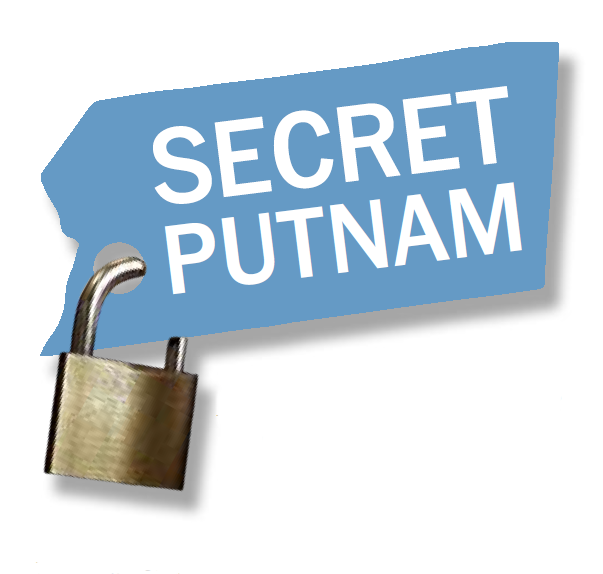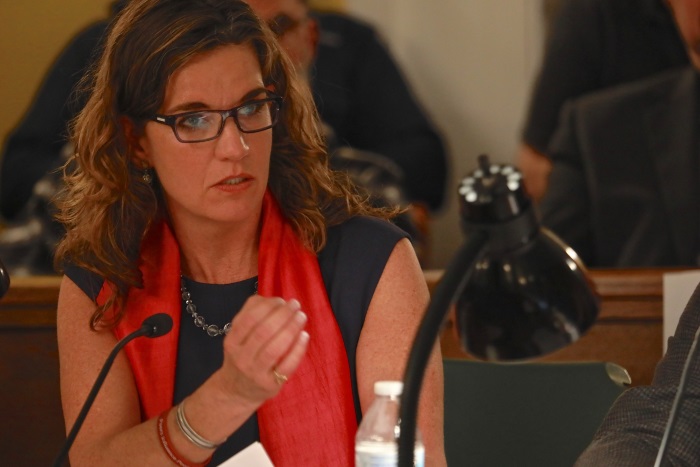 Also wants to amend legislative handbook to ban leaks
Also wants to amend legislative handbook to ban leaks
Two weeks after Putnam County Executive MaryEllen Odell signed a confidentiality law, a legislative panel approved a revised version and sent it to the full Legislature.
On Tuesday (April 13), the three-member Rules Committee also endorsed a separate draft law to amend the legislative manual to “prohibit the unauthorized disclosure of confidential material” and allow lawmakers to censure colleagues who violate the provision.
Legislator Nancy Montgomery (D-Philipstown) asked that the committee postpone action on both measures until absent legislators return, but Neal Sullivan (R-Mahopac), who chairs the Rules Committee, said they “can still say ‘no’ ” when the full Legislature votes.
The Legislature passed the secrecy law on July 2 and Odell signed it on July 30.
As in the existing law, the revised text automatically makes confidential any record created by or sent to or from the Law Department, the Legislature’s legal counsel, or any “outside counsel or consultant.” In addition, the revision permits county officials and employees to share records “conspicuously marked ‘CONFIDENTIAL’ with private consultants, vendors or contractors, for official purposes,” as well as with local, state or federal officials.
The proposed revision removes a line allowing legislators, employees and consultants to designate materials as confidential — a provision that Odell had recommended be dropped. The draft also includes new language protecting whistleblowers from running afoul of confidentiality rules.
The preamble to the revised version said the legislators drafted it in part because of perceptions that the July 2 law “could allow the county to withhold from public disclosure more information than previously.”
“We were not trying to eliminate what the public could see through FOIL [the state Freedom of Information Law],” said Sullivan.
“We never limited FOIL,” Legislator Joseph Castellano (R-Brewster) emphasized. “FOIL remains the same. We’re not marking anything ‘secret.’ ”
Nacerino scolded Montgomery for bringing up the 11-page memo. “It’s sort of a travesty how you go on and on about this,” she said.
Tampering with the state FOI Law “is something we could not do, in any event,” said Legislator Ginny Nacerino (R-Patterson). “We don’t have the ability as a Legislature to exercise anything that’s not dictated by state or federal law. We can’t make up our own rules as we go along.”
In adopting the law in July, she said, the Legislature wanted to “protect confidential information” and “shed some clarity, so those that misinterpret the intent would have verbiage that is clearer and more concise.”
Montgomery voted against passage of the law in July and maintained on Tuesday that understanding its origin is important.
Sullivan, Nacerino and Castellano concurred the law was prompted in part by Montgomery’s request, after the Legislature voted 8-1 to adopt a resolution opposing a new state law regulating abortion, to provide The Current with an 11-page memo from Robert Firriolo, the legislative counsel, in which he responds to Montgomery’s public critique of the resolution.
Both the July 2 secrecy law and the new draft prevent disclosure of any legislative document covered by attorney-client privilege unless all nine legislators agree to release it.
“What was in that 11-page memo that requires protection?” Montgomery asked. “Sometimes we’re protecting attorney-client privilege at the expense of the public.”
Firriolo referred to his 11-page memo as “a piece of attorney advice. It’s not a question of whether there are facts in it that in and of themselves would not be privileged. The entire document constitutes legal advice and analysis” and is confidential, he argued.
Nacerino scolded Montgomery for bringing up the 11-page memo. “It’s sort of a travesty how you go on and on about this,” she said.
Signs of Secrecy
By Chip Rowe
After Putnam County Legislator Nancy Montgomery (D-Philipstown) in July complained that the response to a question she asked of the Highway Department about road signs on behalf of constituents came back marked “confidential” — meaning that, under a proposed law, she couldn’t tell the constituents what it said — The Current filed a Freedom of Information (FOIL) request to see the document.
Two days later — light speed in the world of FOIL — the county Law Department denied the request. Dina DiBlasi, a senior deputy county attorney, explained that a diligent search at the Highway Department had not uncovered any memo addressed to Montgomery. However, she wrote, a diligent search at the county Legislature unearthed a July 16 memo to Montgomery about road signs from First Deputy County Attorney Andrew Negro. Unfortunately, DiBlasi said, the contents of the memo are protected by attorney-client privilege and cannot be revealed.
At a meeting of the Legislature’s Rules Committee on Tuesday (Aug. 13), legislative counsel Robert Firriolo said that the road-sign memo was a “wonderful example” of why the secrecy law was needed.
“Those kinds of legal analyses are privileged,” he asserted. “When the document is FOILed, if there are facts in the document that are independent of legal analyses, the Law Department will review that. But because it’s a mixture of fact and law, it has to be treated as a confidential document until the facts can be separated from the legal analysis” by the Law Department.
The Current plans to appeal to County Executive MaryEllen Odell to overturn the ruling, but in this case, apparently, the document contains no facts.
Montgomery said she encountered another obstacle in July when Garrison constituents asked about signage and highway laws. She sought assistance from the Highway Department to answer their questions but received a response, slugged confidential, from a county attorney.
When Montgomery began to read from the response at a July 24 public hearing on the confidentiality law, some members of the audience attempted to shout her down. In a July 30 memo to legislators, Odell contended that Montgomery’s publicizing of the “confidential” response underscored the need to safeguard attorney-client privilege and for the Legislature to censure any member who leaks confidential information and for Ethics Board reviews and penalties.
Montgomery called the confidential response to a question about road signs “a very important example of why this law fails the public.”
Defending the law, Castellano and Nacerino recalled occasions on which unnamed legislators had released, to a disgruntled resident, Peekskill Hollow Road-related information given to the Legislature in an executive session with a county attorney and divulged details of a pending lawsuit settlement.

Consequently, “it was made clear to me that once we get something from either the county attorney’s office or the legislative counsel’s office, it’s attorney-client privileged,” Castellano said. “And it’s marked ‘confidential.’ Regardless of what it says, it is confidential.” He noted that the public can file a FOIL request and go to court to seek a document’s release.
“If our attorney tells us something in a confidential manner, we’re not supposed to go out and blab it on the street,” Nacerino asserted. She likened the Legislature’s attorney-client privilege to that enjoyed by a private citizen receiving advice from a lawyer.
But Lynne Eckardt, a Southeast Town Board member who said she spoke for herself, not as a town official, called Nacerino’s comparison “a false equivalency. You’re doing the people’s business and that is profoundly different.”
Firriolo disagreed. “Whether the public’s business is at issue is irrelevant to the protection of attorney-client privilege, because legislators have an equal right to a free flow of legal advice and communication as any individual citizen has,” he said. “While ultimately I would agree that the public has a right to know and see transparency in the operations of government, when it comes to providing legal advice, that confidentiality protection is just as strong for public officers and elected officials as it is for members of the public.”
Kristin O’Neill, assistant director of the state’s Committee on Open Government, noted in an email to The Current that according to a number of court rulings, attorney-client privilege “only applies to communications from an attorney in which the attorney is providing legal advice based on the attorney’s legal training and specialized skills. The fact that it is from an attorney is not enough.”

You really have to wonder what exactly do they want to hide?